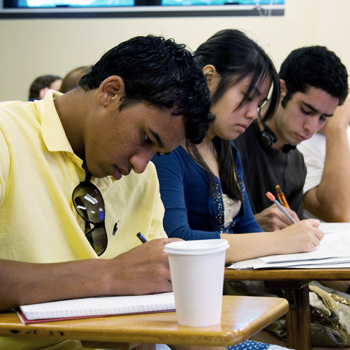Haverford Announces Academic Blueprint for the Future

Details
The Board of Managers of Haverford College has approved a comprehensive blueprint for academic enrichment. This cornerstone of President Stephen G. Emerson's administration will see the creation of 27 new faculty positions in fields that define – and confront -- our world, while enabling students to acquire the research skills necessary to find solutions.
"Haverford students have always been creators, inventors, innovators," says Emerson, himself an alumnus (and MD/Ph.D from Yale University). "Our plan for academic enrichment will allow students to go farther and deeper by providing research opportunities in the emerging fields of our day, in a way that moves beyond the traditional dichotomy of 'teaching-oriented' colleges vs. 'research-oriented' universities. Our plan offers a third path: a learning experience that's grounded in original research conducted by students and faculty working side by side."
The changes represent a roughly 25% increase in tenure line faculty at Haverford. Provost Linda Bell, who together with Prof. Israel Burshatin and the Faculty Committee on Academic Enrichment led the campus-wide conversation that resulted in the new plan, calls it "transformative," adding that it "fulfills the academic mission of the College. First and foremost, the scope and scale of the curriculum is expanding, with a vigorous build-out in the areas of Cross-Cultural and Area Studies; Computational Social & Natural Sciences; Arts, Visual Culture & Performance; and Environmental Studies. Instruction and research will be fostered by our three centers for cross-disciplinary study: The Koshland Integrated Natural Sciences Center; the Hurford Humanities Center and the Center for Peace & Global Citizenship.
"We'll also dramatically increase the opportunity for student scholarship collaboration by allowing much more time for faculty scholarship and research." Currently, faculty teach five classes per year; they'll now have the option to teach four and do more research and scholarship with their students. Rules governing sabbaticals will also become more flexible and research-friendly.
President Emerson says that the role of students in the research process – in what he calls "the creation of knowledge" -- is the key to understanding the purpose of and value in today's changes. "We've always been committed to engaging the restless curiosity that characterizes the Haverford student. But today's changes take this to a new level because they bring boundless opportunities for discovery. And by taking those insights, that knowledge, and fusing it with Haverford's commitment to social responsibility, our students will become agents of change, healing and renewing the world."
Adds Dan Sacks '08, "It's not until you're doing that independent research and you're really forced to synthesize ideas and figure things out for yourself that you've begun to master your learning." Sonia Williams '08 agrees, pointing out that it's one thing to be exposed to an existing body of knowledge, but quite something else to contribute to it. "If you have to enter that space yourself and feel how difficult it is to try and come up with a coherent theory and to see how complex that process is, how complex the world is," she says, "I think it puts you in a more independent space to be an active creator."
The 27 new positions will be phased in over several years, with allocations determined by College leadership. Principal financial support will come from alumni and friends of the College, particularly during the next comprehensive campaign.
"We're gratified by the Board's support for our plan," concludes President Emerson, "and eagerly look forward to its implementation. The faculty is to be commended on its work, not just in terms of plan specifics – which are breathtaking – but also with respect to the thoroughness of their process and clarity of vision. They've been working hard at this for nearly three years, and it shows.
"A Haverford education has always been as unique as it has been exceptional. These next steps represent a logical evolution in what it means to be at Haverford, and of Haverford. It's about more than studying; it's about learning, discovery – and renewal."
The 27 new positions include professors teaching in the following disciplines:
I. Cross-Cultural and Area Studies
• Modern Japanese Culture
• 20th Century American Literature and Culture
• African Diaspora
• Contemporary Chinese Politics
• Peace Justice and Human Rights
• Clinical and Cross-cultural Psychology
• Caribbean or Transatlantic
• Quaker Studies
• Middle Eastern and Islamic Studies
II. Computational Social and Natural Sciences
• Computational Biology
• Quantitative Economics
• Differential Geometry
• Applied Mathematics
• Quantitative Sociology
• Neural Psychology
• Computational Physics
III. Arts, Visual Culture, and Performance
• Visual Studies/Theatre
• Sculpture
• Digital Media Studies
• Film and Cinematic Theory
• Musicology
• Aesthetics
IV. Environmental Studies
• Plant Biology
• Environmental Chemistry
• Environmental Justice
• Public Policy



